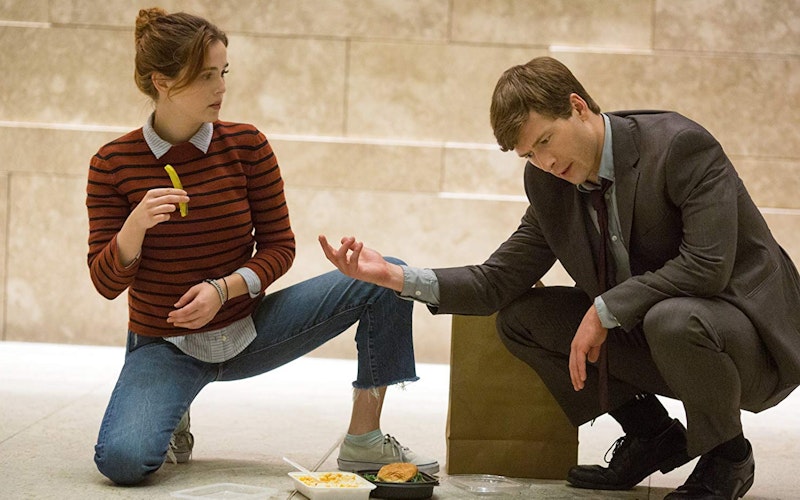
Movies
The Divine Love of Set It Up
In Set It Up, a new romantic comedy on Netflix, love is defined as liking someone because of their qualities and loving someone despite some of those qualities. Stressed corporate assistants Harper (Zoey Deutch) and Charlie (Glen Powell) meet while getting their workaholic bosses dinner; soon they hatch a plan to make their bosses fall in love. If their bosses are busy going on dates, they reason, then Harper will be free to practice her writing and Charlie can get more time with his model girlfriend.
In the beginning, Harper and Charlie clash. Their first meeting is even an argument about buying dinner for their bosses. Harper orders two meals for herself and her boss but doesn’t have the cash to pay; meanwhile, Charlie forgets to order dinner for his boss but has cash. The delivery man only accepts cash and gives the food to Charlie. The two assistants bicker back and forth in a desperate attempt to please both of their demanding employers.
Even when they start playing fate, Harper and Charlie don’t like each other. She is exasperated that he wears a suit to a baseball game when they force their bosses onto the kiss cam. He gets annoyed when she uses vocabulary he doesn’t know, acting like a know-it-all.
The relationship they set up isn’t smooth either. Kirsten (Lucy Liu) and Rick (Taye Diggs) must be frequently babysat and secretly catered to. Charlie and Harper send flowers and expensive liquor with forged notes, which tricks their bosses into liking and loving the idea of the other person.
Eventually, Harper and Charlie begin to like each other as friends, as seen when they laugh and high-five at the end of the aforementioned baseball game. As their relationship progresses, they give each other dating advice, career advice, make jokes, and arrange their bosses’ dates to benefit each others’ schedule. They even attend an engagement party together, where the movie’s definition of love is delivered. On a beautiful night, with glowing lights on a roof in New York City, strings and piano quietly crescendo as we’re told that to love someone is to like because and love despite. Charlie and Harper simply nod in agreement, though they do not yet seem to fully understand.
Kirsten and Rick, their bosses, are even more in the dark. The qualities that they like about each other are qualities that their assistants attribute to them, not their actual qualities. Aggressive and perfectionist Rick can’t fathom loving someone despite certain qualities. Kirsten can’t love someone she doesn’t know and who has no interest in actually loving her. Will Charlie and Harper find something truer, despite his poor beer pong skills and her sore winner habits?
Liking because and loving despite is not only the definition of love in Set It Up; it also describes God’s love for us. Yes, this is an oversimplified definition, given the many complications that come with romantic relationships and the arduous process of sanctification that God leads us through. But perhaps simplified definitions are best when it comes to expansive topics such as God’s love.
Liking "because" and loving "despite" also describes God’s love for us.
Evidence for God liking us can be seen at the very start, in Genesis. He breathed life into our lungs, placed us in an abundant garden, gave us authority, and spent time with us. He likes us as his children because we glorify him through our service to others, heartfelt worship, and our daily strivings against our sinful nature. When we use the gifts he’s given us, when we enjoy our earthly life, and when we reflect him in our relationships, he likes us.
God loves us despite our sin. Since our disobedience in the garden, God has made his love for us clear: he would bring about salvation, reconciling us with himself through the sacrifice of Jesus, which would bring us victory over sin and death. The constant gift of the Holy Spirit is further proof of his endless love for us, despite our daily failings.
Beyond that, we should also rejoice that God doesn’t stop with liking because and loving despite. We may be content with loving one another as we are, but God’s love is transformational. He loves us until we look like him. The popular saying that “God accepts us as we are but loves us too much to leave us that way” has evidence throughout Scripture: shepherd boy David became a king; orphan Hadassah became Queen Esther; terrorist Saul became preacher Paul. In each case, God liked the person, God loved the person, and God’s love led the person through the valleys and mountaintops in order to make them more like him.
Liking because and loving despite may simplify the complicated experience that is love, yet we can celebrate that Set It Up communicates this truth: God likes us, God loves us, and his love transforms us into the people we were created to be.
Topics: Movies